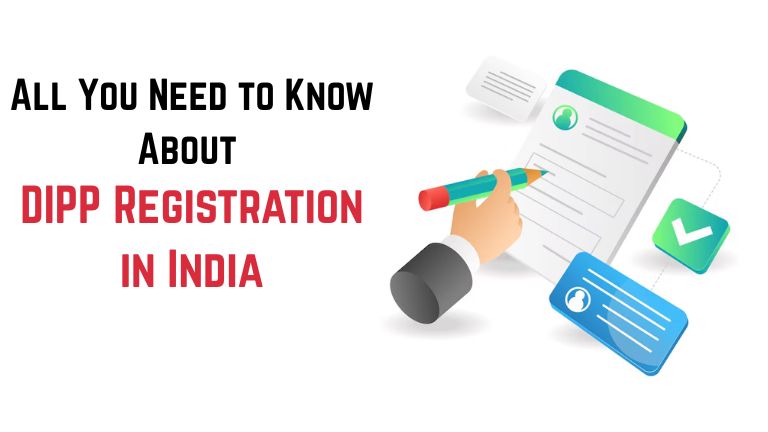In the rapidly growing startup ecosystem of India, standing out from the
competition requires more than just a brilliant idea—it demands access to the
right support systems and official recognition. One such vital support
mechanism is DIPP registration, an initiative by the Government of India
aimed at promoting innovation and fostering the growth of startups. If you are
a budding entrepreneur or planning to launch your startup, obtaining DIPP
recognition could be a game-changer.
This article will guide you through the essentials of DIPP registration,
its benefits, eligibility criteria, application process, and frequently asked
questions.
What is DIPP Registration?
DIPP stands for the Department for Promotion of Industry and Internal
Trade, previously known as the Department of Industrial Policy and
Promotion. The DIPP functions under the Ministry of Commerce and Industry,
Government of India.
DIPP registration is part of the Startup India initiative launched
in 2016. It offers various benefits and support to startups, such as funding assistance,
tax exemptions, ease of compliance, and networking opportunities with investors
and government bodies.
Registering under DIPP helps startups gain official recognition from the
Indian government, which opens the doors to exclusive benefits and incentives
aimed at nurturing entrepreneurial growth.
Key Benefits of DIPP Registration
The advantages of obtaining DIPP registration are extensive and highly
valuable for early-stage businesses. Here are the most noteworthy benefits:
1. Tax Exemption for 3 Years
Startups that are DIPP-recognized can apply for an income tax exemption
under Section 80 IAC of the Income Tax Act. Once approved, startups enjoy a
100% tax holiday for three consecutive financial years out of the first ten
since incorporation.
2. Exemption from Angel Tax
Section 56(2)(viib) of the Income Tax Act, commonly known as the angel
tax, previously taxed the premium received on shares issued by startups. DIPP
registration allows startups to apply for exemption from this provision.
3. Self-Certification under Labor and Environmental
Laws
Recognized startups can self-certify their compliance under various
labor and environmental laws for up to five years from the date of
incorporation. This significantly reduces the regulatory burden and risk of
legal hassles.
4. Access to Government Tenders
Startups with DIPP registration are allowed to participate in government
tenders, often without the requirement of prior experience or turnover, making
it easier for new businesses to secure government contracts.
5. Fast-Tracking Patent Applications
DIPP-recognized startups can fast-track their patent applications at
significantly reduced costs. The government also provides facilitators to help
file intellectual property claims at subsidized rates.
6. Funding Support through SIDBI
The government has created a Fund of Funds for Startups (FFS)
with a corpus of INR 10,000 crore. Startups with DIPP recognition become
eligible to receive funding support through SIDBI and other venture funds.
7. Networking and Exposure
DIPP-registered startups get access to startup hubs, investor meetups,
and industry events organized by Startup India and associated bodies.
Eligibility Criteria for DIPP Registration
To be eligible for DIPP registration, a startup must meet the
following conditions:
- Incorporation
Age: The startup must be incorporated as a Private Limited Company,
Limited Liability Partnership (LLP), or Registered Partnership
Firm for not more than 10 years.
- Annual
Turnover: The firm should have an annual turnover not exceeding INR 100
crore in any financial year since incorporation.
- Innovation
Requirement: The entity must be working towards innovation, development, or
improvement of products or services. It must also have the potential for
generating employment or wealth creation.
- Original
Entity: The entity should not have been formed by splitting up or
reconstructing an already existing business.
Step-by-Step Process for DIPP Registration
Applying for DIPP registration is a digital process and can be completed
via the official Startup India registration portal. Here is a step-by-step guide:
Step 1: Incorporate Your Business
Ensure your startup is legally incorporated as a Private Limited
Company, LLP, or Partnership firm.
Step 2: Register on the Startup India Portal
Visit the Startup
India website and create a profile using your email ID. Complete the startup
registration form with required business details.
Step 3: Fill the DIPP Registration Form
Once registered, apply for DIPP recognition by filling out the
relevant application form on the portal. You will need to provide:
- Business
PAN
- Incorporation/Registration
Certificate
- Details
of the business activities
- Directors/Partners'
details
- Write-up
about the nature of innovation or problem-solving
Step 4: Upload Supporting Documents
In addition to business details, you must upload:
- A brief
description of how the startup is innovative or scalable
- Pitch deck,
prototype, or website link (if available)
- Proof
of concept such as awards, patent, publication, or customer testimonials
(if applicable)
Step 5: Submit and Track Status
After submission, you will receive an acknowledgment. The DIPP
authorities will review your application, and if approved, you’ll receive a
DIPP recognition number and certificate via email.
Common Mistakes to Avoid
To ensure a smooth application process, avoid these common errors during
your DIPP registration:
- Submitting
incomplete or incorrect information
- Failing
to clearly demonstrate innovation or uniqueness
- Not
providing a valid business incorporation certificate
- Uploading
poor-quality or irrelevant supporting documents
Ensuring your application is professional, accurate, and well-documented
greatly increases your chances of approval.
FAQs on DIPP Registration
1. Is DIPP registration mandatory for startups in
India?
No, DIPP registration is not mandatory but highly recommended for
startups looking to avail of government schemes and benefits.
2. Is there any registration fee involved?
No, the process of DIPP registration is completely free of cost.
3. Can foreign companies apply for DIPP
registration?
Only startups incorporated in India as a Private Limited Company, LLP,
or Registered Partnership Firm are eligible.
4. How long does it take to receive DIPP
recognition?
Typically, it takes 7–10 working days for the DIPP authorities to
process and approve a registration application, subject to the accuracy and
completeness of your documentation.
ALSO READ POPULAR ARTICLES

